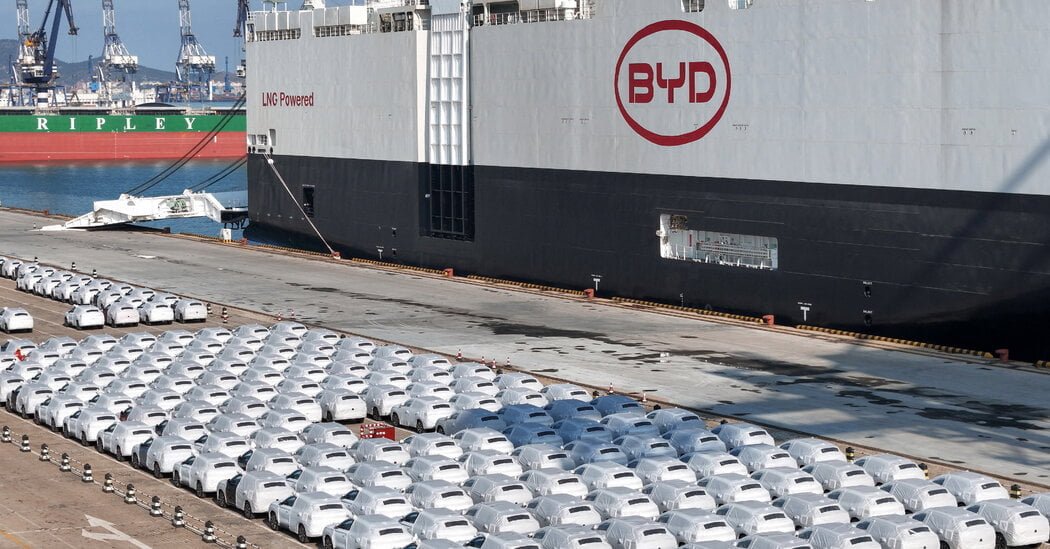The European Union stated on Wednesday that it might impose extra tariffs of as much as 38 % on electrical vehicles inbuilt China, a transfer it stated would assist stage the enjoying subject for automakers in Europe.
The tariffs, which have been anticipated for months, come on prime of current 10 % duties, however the stage of their impression has been disputed. Some European automakers argue they may set off a commerce struggle, however different consultants have stated they won’t cease China’s dominance within the business.
Instead, they argue that incentives to make low-emission vehicles extra enticing to drivers are wanted as an alternative, if the European Union hopes to satisfy its purpose to ban the sale of latest inner combustion engine autos in 2035.
What does this imply for shoppers?
Industry consultants predict that the elevated duties on electrical autos from China will damage shoppers greater than they do Chinese automakers, by rising the worth of probably the most inexpensive electrical vehicles available on the market.
But in line with an investigation by the European Union, all the provide chain of Chinese electrical vehicles get pleasure from authorities subsidies that enable automakers there to drastically scale back their manufacturing prices. This offers Chinese producers an unfair aggressive edge over their European rivals, the European investigation discovered.
BYD’s Dolphin mannequin, for instance, sells in Europe for about 32,400 euros, or about $34,900, in contrast with practically €40,000 for a Tesla Model Y and €37,000 for a Volkswagen ID.4.
Clamping down on E.V. exports to E.U. nations might drive extra automakers in China to shift meeting to European nations like Hungary or Spain, the place prices for labor and components are greater, leading to greater prices for shoppers.
How will this have an effect on European automakers?
Many European automotive producers are closely depending on China, the world’s largest marketplace for vehicles, for each exports and manufacturing within the home market.
“This choice for added import duties is the fallacious option to go,” Oliver Zipse, chief govt of BMW, stated on Wednesday. “The E.U. Commission is thus harming European corporations and European pursuits.”
German producers, BMW, in addition to Mercedes and Volkswagen, not solely promote to the Chinese, but in addition have massive manufacturing and analysis and improvement operations in China. They worry that any retribution from Beijing might hurt their enterprise.
Others stay all for collaborations with the Chinese. Last month, Stellantis stated that it might begin promoting two fashions in Europe from its three way partnership with the Chinese automaker Leapmotor as a part of efforts to avoid the tariffs.
Was the E.U. simply following the United States?
The Biden administration introduced final month that it might impose new tariffs of one hundred pc on Chinese electrical autos. That measure quadrupled the tariffs that the United States beforehand charged for overseas vehicles, in an effort to protect the American auto business from Chinese competitors.
Some analysts had apprehensive that tariffs set at a decrease stage may not be sufficient to cease Chinese-made electrical autos from coming into the United States, given the massive worth differential between Chinese- and American-made vehicles.
But Wendy Cutler, the vice chairman of the Asia Society Policy Institute and a former U.S. commerce official, stated the one hundred pc stage can be excessive sufficient to dam that commerce. “That’s what we name a prohibitive tariff. It actually cuts commerce off,” she added.
The European Union started an investigation into Chinese E.V. subsidies in October, citing what leaders stated was unfair competitors, particularly from China’s three main makers of electrical vehicles, BYD, Geely and SAIC.
How did the E.U. get right here?
The European Union is raring to keep away from falling into an identical state of affairs because it did within the late 2000s, when Beijing pumped massive sums of cash into photo voltaic vitality know-how, enabling home producers to make multibillion-dollar investments in new factories and acquire market share globally.
China’s increase in manufacturing prompted the worth of panels to plummet, forcing dozens of corporations in Europe and the United States out of enterprise. That led the European Commission to open an anti-dumping investigation that resulted in punitive tariffs on the Chinese panels.
But China retaliated, saying its personal investigation into exports of European wine and photo voltaic panel parts, a transfer that divided the bloc. That allowed China to pit them in opposition to each other, finally main the Europeans to again down.
More than a decade on, Germany’s photo voltaic business remains to be struggling, and low cost photo voltaic panels from China dominate the market.
What occurs subsequent?
Even earlier than the announcement on tariffs from Brussels, demand for Chinese E.V.s in Europe had begun slowing down, as Germany and France reduce on subsidies for electrical vehicles.
Last month, Great Wall Motors stated that it was closing its headquarters in Munich, citing “the more and more difficult European electrical automobile market, coupled with quite a few uncertainties sooner or later.”
But BYD, China’s main producer of electrical vehicles and a sponsor of the 2024 European soccer championship that begins in Germany on Friday, stays centered on Europe. The firm is already constructing a manufacturing facility in Hungary and is contemplating a second one.
Ana Swanson contributed from Washington.




